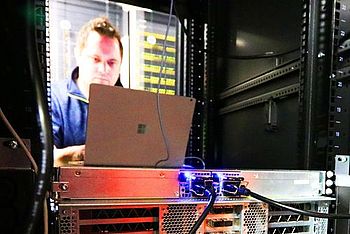New Computer Architecture: Time Lapse for Dementia Research

IT technician at the DZNE’s computing center. Source: DZNE
Time is running out: Dementias such as Alzheimer's disease are already one of the biggest challenges in medicine today. The problem will increase due to the growing elderly population.
New approaches to prevention and therapy could result from the analysis of genomic and brain imaging data.
But their evaluation requires enormous computing power. Therefore, the DZNE and Hewlett Packard Enterprise (HPE) have started a collaboration to realize the potential of Memory-Driven Computing for medical research.
The DZNE is the first institute in the world to use this radically new computer architecture for biomedical research.
Following a joint feasibility study, DZNE and HPE now take the next step: The new high-performance computer “HPE Superdome Flex” has just been put into operation at the DZNE’s computing center in Bonn.
So far, the DZNE scientists had tested their algorithms on HPE computers in the USA. Already with that, it was possible to shorten the time of a genomic computing process from 22 minutes to 13 seconds.
Now the Bonn researchers have their own system available.
https://www.dzne.de/en/news/public-relations/press-releases/press/detail/new-com… Complete press release
Media Contact
More Information:
http://www.dzne.deAll latest news from the category: Medical Engineering
The development of medical equipment, products and technical procedures is characterized by high research and development costs in a variety of fields related to the study of human medicine.
innovations-report provides informative and stimulating reports and articles on topics ranging from imaging processes, cell and tissue techniques, optical techniques, implants, orthopedic aids, clinical and medical office equipment, dialysis systems and x-ray/radiation monitoring devices to endoscopy, ultrasound, surgical techniques, and dental materials.
Newest articles

First-of-its-kind study uses remote sensing to monitor plastic debris in rivers and lakes
Remote sensing creates a cost-effective solution to monitoring plastic pollution. A first-of-its-kind study from researchers at the University of Minnesota Twin Cities shows how remote sensing can help monitor and…

Laser-based artificial neuron mimics nerve cell functions at lightning speed
With a processing speed a billion times faster than nature, chip-based laser neuron could help advance AI tasks such as pattern recognition and sequence prediction. Researchers have developed a laser-based…

Optimising the processing of plastic waste
Just one look in the yellow bin reveals a colourful jumble of different types of plastic. However, the purer and more uniform plastic waste is, the easier it is to…



